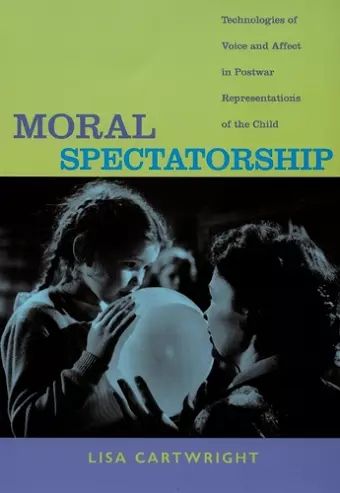Moral Spectatorship
Technologies of Voice and Affect in Postwar Representations of the Child
Format:Paperback
Publisher:Duke University Press
Published:18th Mar '08
Currently unavailable, and unfortunately no date known when it will be back

An innovative film theory book that takes off from The Miracle Worker and other mid-century films about young deaf girls
Lisa Cartwright contributes to feminist film theory by developing a new psychoanalytic theory of spectatorship and human subjectivity.Why were theories of affect, intersubjectivity, and object relations bypassed in favor of a Lacanian linguistically oriented psychoanalysis in feminist film theory in the 1980s and 1990s? In Moral Spectatorship, Lisa Cartwright rethinks the politics of spectatorship in film studies. Returning to impasses reached in late-twentieth-century psychoanalytic film theory, she focuses attention on theories of affect and object relations seldom addressed during that period. Cartwright offers a new theory of spectatorship and the human subject that takes into account intersubjective and affective relationships and technologies facilitating human agency. Seeking to expand concepts of representation beyond the visual, she develops her theory through interpretations of two contexts in which adult caregivers help bring children to voice. She considers several social-problem melodramas about deaf and nonverbal girls and young women, including Johnny Belinda, The Miracle Worker, and Children of a Lesser God. Cartwright also analyzes the controversies surrounding facilitated communication, a technological practice in which caregivers help children with communication disorders achieve “voice” through writing facilitated by computers. This practice has inspired contempt among professionals and lay people who charge that the facilitator can manipulate the child’s speech.
For more than two decades, film theory has been dominated by a model of identification tacitly based on the idea of feeling what the other feels or of imagining oneself to be the other. Building on the theories of affect and identification developed by André Green, Melanie Klein, Donald W. Winnicott, and Silvan Tomkins, Cartwright develops a model of spectatorship that takes into account and provides a way of critically analyzing the dynamics of a different kind of identification, one that is empathetic and highly intersubjective.
“Moral Spectatorship is an important and brave book that dares to consider the formation of subjectivity and intersubjectivity in cinema (and life) through concepts such as feeling, affect, dependency, and care. Drawing upon psychoanalytic theory (not Lacan’s), Lisa Cartwright writes with both passion and skepticism about—and around—a selection of films that foreground the radically ethical nature of human communication, reminding us that film studies can change not only the way we see films but also the way we view our lives.”—Vivian Sobchack, author of Carnal Thoughts: Embodiment and Moving Image Culture
“Uncovering alternative traditions in the psychoanalytic study of affect and object relations, while pairing them with deep explorations of American and continental moral philosophy, Lisa Cartwright proposes a series of arguments that will radically remap our understanding of spectatorship and identification. Moral Spectatorship is a path-breaking book and perhaps the first entirely new approach to subject, empathy, and affect in visual cultural studies to have appeared in the new millennium.”—D. N. Rodowick, Professor of Visual and Environmental Studies, Harvard University
ISBN: 9780822341949
Dimensions: unknown
Weight: 426g
304 pages